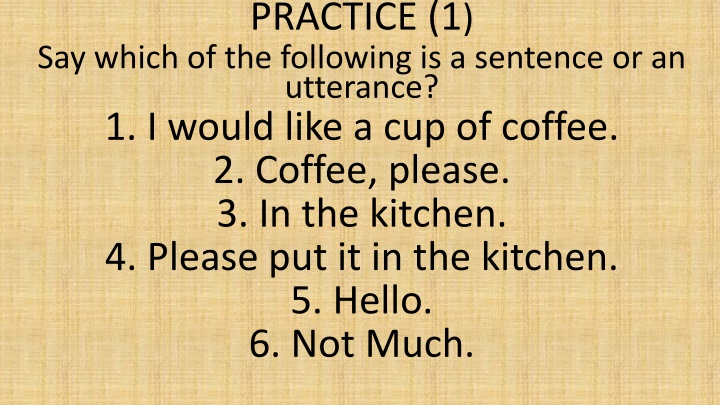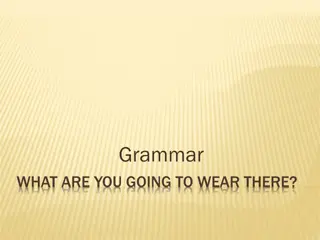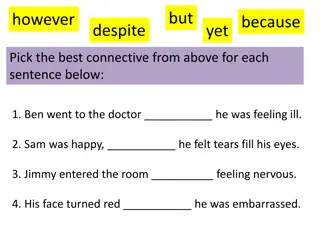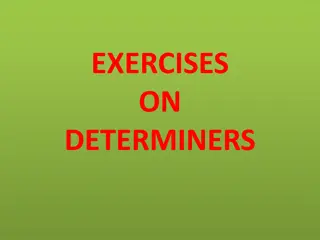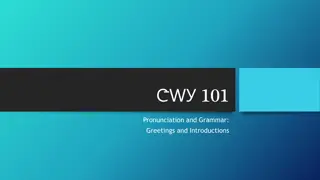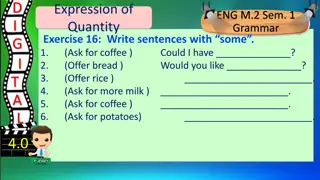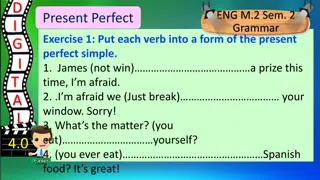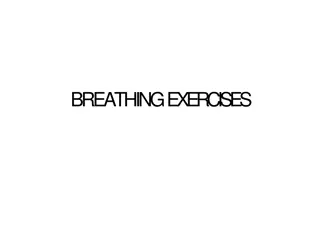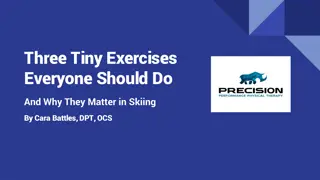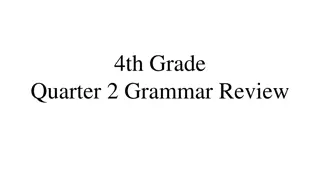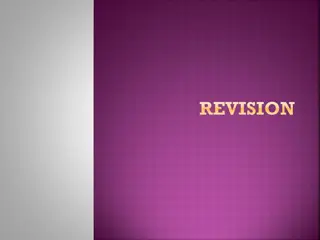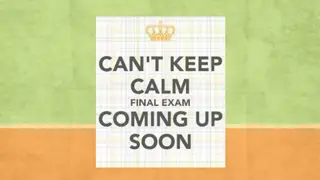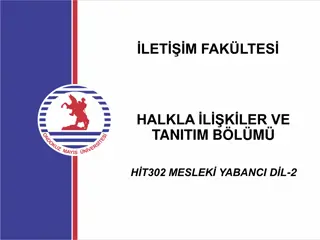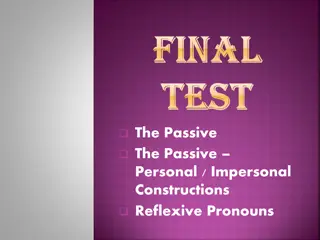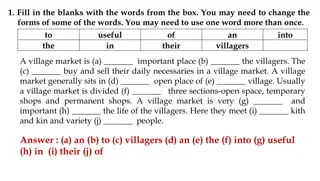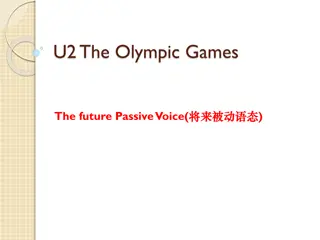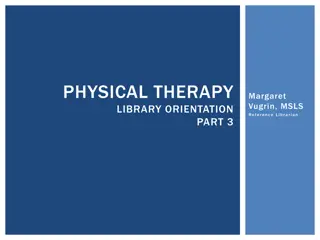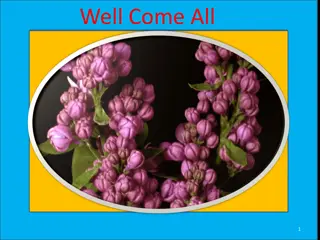Language Practice Exercises
Series of language practice exercises involving identifying sentences or utterances, determining applicable phrases to utterances and sentences, categorizing sentences as analytic, synthetic, or contradictory, and deciding if one sentence entails another. The exercises cover various language aspects and provide opportunities for practice and learning.
Download Presentation

Please find below an Image/Link to download the presentation.
The content on the website is provided AS IS for your information and personal use only. It may not be sold, licensed, or shared on other websites without obtaining consent from the author.If you encounter any issues during the download, it is possible that the publisher has removed the file from their server.
You are allowed to download the files provided on this website for personal or commercial use, subject to the condition that they are used lawfully. All files are the property of their respective owners.
The content on the website is provided AS IS for your information and personal use only. It may not be sold, licensed, or shared on other websites without obtaining consent from the author.
E N D
Presentation Transcript
PRACTICE (1) Say which of the following is a sentence or an utterance? 1. I would like a cup of coffee. 2. Coffee, please. 3. In the kitchen. 4. Please put it in the kitchen. 5. Hello. 6. Not Much.
PRACTICE (2) PRACTICE (2) Decide which of the following phrases may apply to Decide which of the following phrases may apply to UTTERANCES and/or SENTENCES: UTTERANCES and/or SENTENCES: 1. Can be loud or quiet 1. Can be loud or quiet 2. Can be grammatical or not 2. Can be grammatical or not 3. Can be true or false 3. Can be true or false 4. In a particular regional accent 4. In a particular regional accent 5. In a particular language 5. In a particular language 6. Time and place 6. Time and place
PRACTICE (3) Write (A) for analytic, (S) for synthetic and (C) for contradictory: (1) John s brother is nine years old. (2) John s nine-year-old brother is a boy. (3) Sam s wife is married. (4) Sam s wife is not German. (5) My watch is slow. (6) My watch is a device for telling the time. (7) That girl is her own mother s mother. (8) The boy is his own father s son. (9) Alice is Ken s sister. (10) Some typewriters are dusty. (11) John killed Bill, who remained alive for many years after.
PRACTICE (4) PRACTICE (4) Decide whether sentence A entails sentence B:
(1) A: John is a bachelor 1) A: John is a bachelor B: John is a man B: John is a man (2) A: Eliza plays the fiddle (2) A: Eliza plays the fiddle B: Someone plays a musical instrument B: Someone plays a musical instrument (3) A: I ve done my homework (3) A: I ve done my homework B: I haven t brushed my teeth B: I haven t brushed my teeth
( (4) A: Some of the students came to the party 4) A: Some of the students came to the party B: Not all of the students came to the party B: Not all of the students came to the party (5) A: Mary owns three canaries (5) A: Mary owns three canaries B: Mary owns a canary B: Mary owns a canary (6) A: John picked a tulip (6) A: John picked a tulip B: John didn t pick a rose B: John didn t pick a rose
(7) A: John saw a big mouse (7) A: John saw a big mouse B: John saw a big animal B: John saw a big animal (8) A: A tall pygmy came in (8) A: A tall pygmy came in B: A tall person came in B: A tall person came in (9) A: We went in a small bus (9) A: We went in a small bus B: We went in a small vehicle B: We went in a small vehicle (10) A: That was an expensive sandwich (10) A: That was an expensive sandwich B: That was an expensive meal B: That was an expensive meal (11) A: Mary broke the window (11) A: Mary broke the window B: The window broke B: The window broke
PRACTICE (5) PRACTICE (5) Look at the following and circle the statements of entailment as correct (C) Look at the following and circle the statements of entailment as correct (C) or incorrect (I): or incorrect (I): (1) (1) John cooked an egg entails John boiled an egg. John cooked an egg entails John boiled an egg. (2) (2) John boiled an egg entails John cooked an egg. John boiled an egg entails John cooked an egg. (3) (3) I saw a boy entails I saw a person. I saw a boy entails I saw a person. John stole a car entails John took a car. . (4) (4) John stole a car entails John took a car
PRACTICE (6) Look at the following pairs of sentences and see if they have the same set of entailments (Yes) or not (No) (i.e. see if they are paraphrases of each other):
(1) No one has led a perfect life Someone has led a perfect life (2) We ve just bought a dog We ve just bought something (3) The house was concealed by the trees The house was hidden by the trees (4) I ran to the house I went to the house (5) It is hard to lasso elephants Elephants are hard to lasso
PRACTICE (7) Are the following pairs paraphrases of each other?
1) John is the parent of James 1) John is the parent of James James James is the child of John is the child of John (2) John is the parent of James (2) John is the parent of James James James is the parent of John is the parent of John (3) My father owns this car (3) My father owns this car This car belongs to my father This car belongs to my father
(4) The fly was on the wall The wall was under the fly (5) Some countries have no coastline Not all countries have a coastline (6) Fred sent Mary a new book Fred sent a new book to Mary (7) Jerry took out the garbage Jerry took the garbage out
PRACTICE (8) PRACTICE (8) What is intended by the word (mean), What is intended by the word (mean), (meaning), etc. in the following (meaning), etc. in the following examples, examples, reference (R) or sense (S)? reference (R) or sense (S)?
(1) When Helen mentioned the fruit (1) When Helen mentioned the fruit cake , she meant that cake , she meant that rock rock- -hard object in the middle of the hard object in the middle of the table. table. (2) When Albert talks about his former (2) When Albert talks about his former friend he means me. friend he means me.
(3) Daddy, what does unique mean? (4) Purchase has the same meaning as buy.
(5) Look up the meaning of apoplexy in 5) Look up the meaning of apoplexy in your dictionary. your dictionary. (6) If you look out of the window now, (6) If you look out of the window now, you ll see who I mean you ll see who I mean.
PRACTICE (9) PRACTICE (9) Circle the referents in the Circle the referents in the following sentences: following sentences:
1. 1. The hospital is outside the city. The hospital is outside the city. 2. 2. My dog bit the postman. My dog bit the postman. 3. 3. Mr. John is waiting for the downtown bus. Mr. John is waiting for the downtown bus.
4. Cairo is in Africa. 5. This place is nice. 6. John s car is red. 7. Einstein was a genius.
